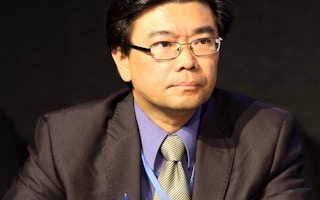It is 12 midnight on the last Saturday before the conclusion of the world’s biggest climate summit.
To continue reading, subscribe to Eco‑Business.
There's something for everyone. We offer a range of subscription plans.
- Access our stories and receive our Insights Weekly newsletter with the free EB Member plan.
- Unlock unlimited access to our content and archive with EB Circle.
- Publish your content with EB Premium.
The Conference of the Parties (COP) to the United Nations Framework Convention on Climate Change (UNFCCC) are two-week gatherings that have been held yearly for almost three decades in a bid to make major resolutions to combat worsening impacts of global warming.
The crowd of delegates from nearly 200 countries, dozens of world leaders and hundreds of the biggest companies and nonprofits has dissipated. At the venue, negotiators, however, are huddling in a room to grapple with the final wording of text that could potentially shift the discourse on climate change for the long term. Most of them have not eaten a proper meal, and are surviving on energy bars and the water served for free at the venue.
This is a typical scene into the last hours at the COPs, said Vicente Paolo Yu III, coordinator for the biggest negotiating bloc of low-income countries at the conference, the Group of 77 (G77) and China. The Asian superpower is not classified a developed country under international standards and has provided consistent support to the G77 on climate issues.
Yu, a Filipino lawyer, has been involved in climate change negotiations since 2007, working with various country delegations in the UNFCCC, including his home country, the Philippines, and with G77. His task is to bring together all the representatives under the group, composed of the Arab, African, Latin American, small islands group, and the smaller developing countries.
With climate impacts worsening and the window to a 1.5°C world rapidly closing, the stakes are higher than ever for negotiators like Yu. Since the Paris Agreement in 2015, there has been increasing public interest in such global climate meetings. However, to many, these closed door sessions remain a mystery.
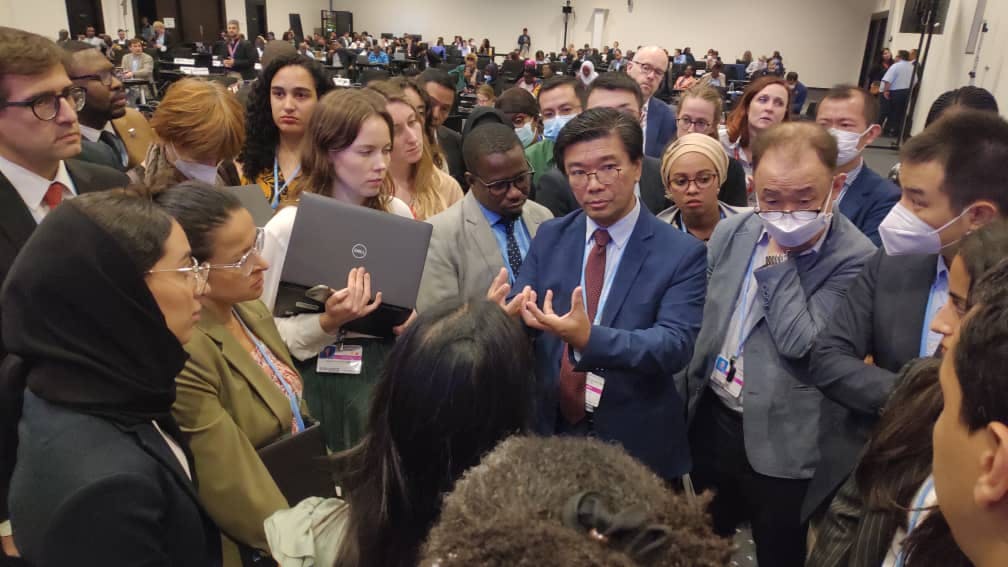
Members of the G77 gather around Vicente Paolo Yu III for a briefing at COP27 in Sharm El Sheikh, Egypt. Image: Vice Yu
Here, Yu gives a rare glimpse of how a typical day unfolds for him during the summit. He also shares what he thinks makes the job challenging, and what he derives fulfilment from:
6am: I wake up and have a quick breakfast at the hotel.
Like many developing country negotiators, I arrive several days before the conference officially starts. The G77 usually has a two-day preparatory meeting where we finalise our decisions and strategies on key issues like loss and damage and the global stocktake, which I will be focusing on for the upcoming COP28 in Dubai.
6.30 am: I take a train to the venue which is usually outside of the city for security reasons. For COP27 in Sharm El Sheikh, Egypt last year, the venue was somewhere between 45 minutes to an hour from my hotel. If I were to take a taxi, it would take about 20 minutes. Since cabs are expensive, I just take the train.
7.30am: I arrive early at the venue to give time for security checks. There is always a long queue to swipe your badge and put your bags under the x-ray.
8am: Like most negotiators, I have to be at the venue at this time because there are national delegation or sub-group meetings before the start of the negotiations.
We need to be early to review the agenda for the day and check what thematic sessions we are going to be focusing on. I also have a look at the daily schedule that is published by the conference secretariat, to see when and where all of the negotiating meetings will take place.
“
We don’t take things too personally at the negotiations because these are individuals who are doing their best to represent their country or group in an official capacity in the same way that you are. You just have to give that kind of respect to them.
9am: We have the G77 coordination meeting where I have to report to the group on what we discussed the day before.
10am: This is when official negotiations begin. They usually have one and a half hour tranches.
1pm: We are supposed to have our lunch break at this time, but in our case, we attend the G77 coordination meetings while trying to grab a bite. On Wednesdays to Fridays of the first and especially the second week of the conference, we don’t usually have time to sit down for lunch. I just grab a sandwich as I walk from one meeting to another. Sometimes I just have an energy bar.
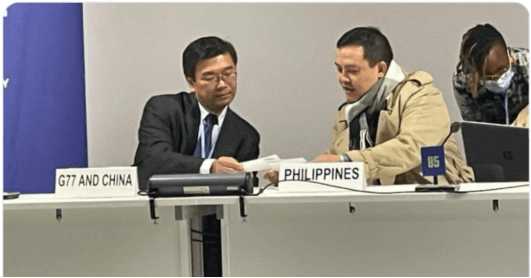
Vicente Paolo Yu III at the negotiations with Wimpy Fuentebella, undersecretary for power, renewable energy, media affairs of the Philippine department of energy, at COP27 in Sharm El Sheikh, Egypt. Image: Vice Yu
One thing that people must understand is that most negotiators at the COP don’t do it as their full-time job. We do it pro-bono. Most negotiators are government officials, and as for myself, I am an independent consultant for various organisations like the United Nations and the Philippine Climate Change Commission.
While they are at the negotiating table, I observe that many colleagues are still busy keeping track of what’s happening in their offices back home.
3pm: The second tranche of the meeting convenes. The chairs of the secretariat will usually warn us that the discussions must end at 6pm but this rarely happens, especially when we have to reach a decision for the final text.
6pm: We take a break for dinner.
Because we are all colleagues, and in many cases, also friends, we try to make time to either go out for dinner and have a beer at least once or twice in the course of the two weeks. This applies whether you’re from a developed country or from the developing countries.
We don’t take things too personally at the negotiations because these are individuals who are doing their best to represent their country or group in an official capacity in the same way that you are. It does not imply anything about who they are as a person. You just have to give that kind of respect to them.
7.30pm: The meeting reconvenes.
On the final days of the conference, it becomes very intense and exciting.
Last year, on the final Saturday of the conference, there was this constant fight over how to deal with the loss and damage fund.
We already agreed that we would have the fund but the sticking point was the issue of how developed countries wanted to make sure that the funding goes only to those that they describe as “most vulnerable”, which for them refers to the least developed countries (LDCs) and the small island nations.
To put it in context, low-income countries like the Philippines, Malaysia, Brunei, Indonesia, or Vietnam would not be eligible for the fund because by definition, we are not an LDC or a small island state. Ironically, Singapore would be eligible because it is a small island state, even if it is not a low-income economy.
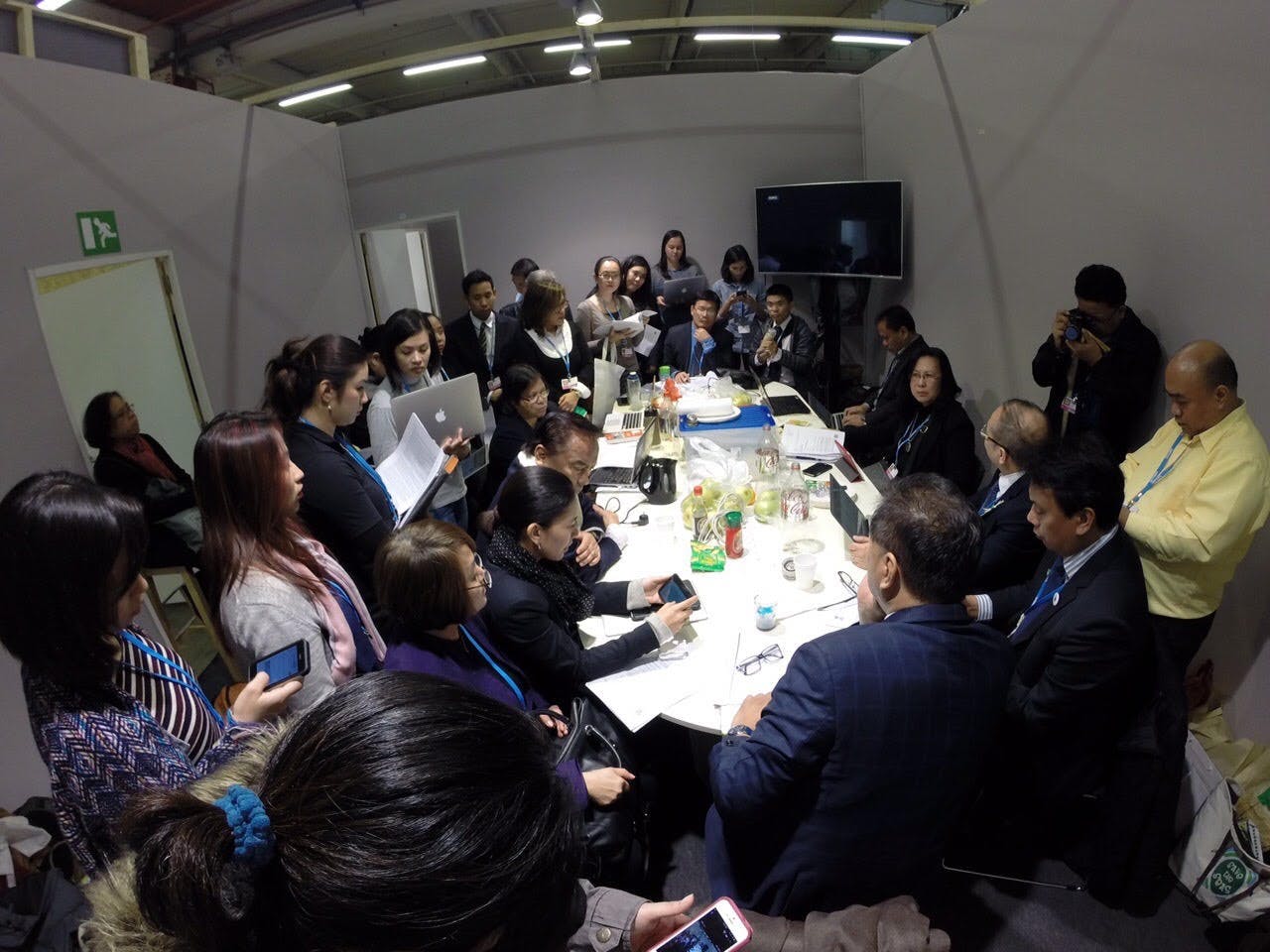
Philippine negotiators hold a meeting at the COP21 in Paris in 2015. Image: Ciimate Change Commission
After hours of arguing, it was finally agreed that the loss and damage fund would be to assist developing countries that are “particularly vulnerable” to the adverse effects of climate change, instead of going with those that are “most vulnerable”.
This is significant because “particularly vulnerable” is a phrase that is already in the climate convention, which identifies all developing countries to be such. The phrase “most vulnerable” is not in the convention, not in the Paris agreement, and it is not agreed language anywhere.
It is quite interesting because it shows the power of words, and why words are very important when you are trying to negotiate.
9pm: Sometimes we leave the agenda items for the next day, but on the final days of negotiations, we go on with the meetings. There is no food served and all restaurants are closed by this time. You have to bring your own food, but the venue always has drinking water available for free.
12 am: On the Friday or Saturday night of the first and second week, there are times when we no longer go back to the hotel. We take a nap at the conference venue. This is the time when we are usually trying to finish a negotiating text and the document needs to be submitted to the chairs and the secretariat so that they can be edited and prepared for adoption the next day.
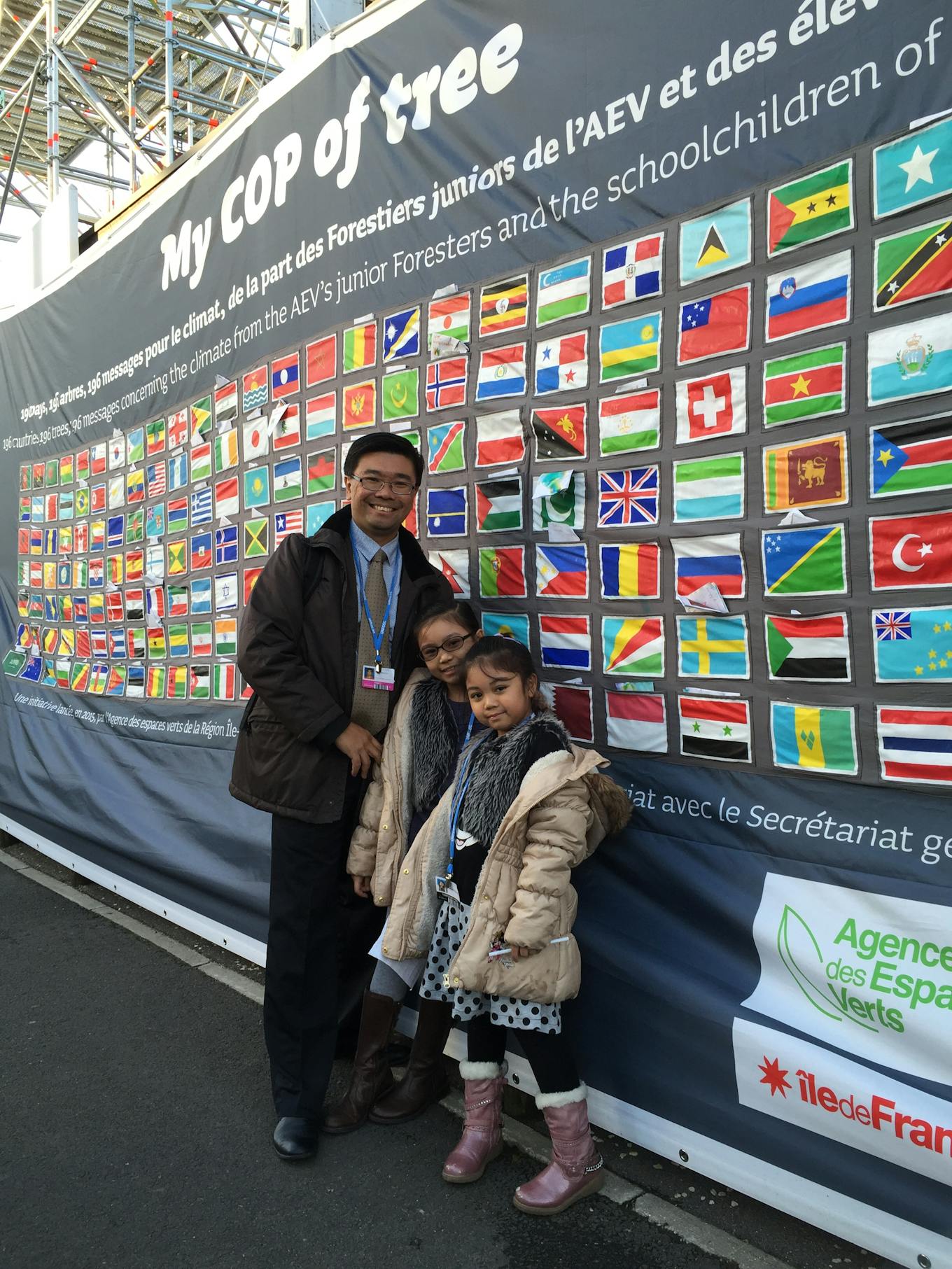
Vicente Paolo Yu III with his two young daughters at COP15 in Paris in 2021. Image: Vice Yu
I remember in Glasgow in 2021, we were trying to negotiate the functions of the Santiago Network (a body to build technical expertise on dealing with loss and damage, such as helping countries consider how to move communities away from threatened shorelines).
There was one particular paragraph that we were trying to focus on where as G77, we kept on insisting that it must refer to “loss and damage” as “finance” because we were already setting up the stage to table a proposal on it.
Colleagues on the other side refused because it was going to be another pot of money that they have to contribute to. There was also this feeling that if they do agree to have a loss and damage fund, it is an implicit acceptance that they are liable to pay compensation to developing countries or admitting their historical responsibility for global warming due to historical emissions.
I had colleagues who lost their cool and started telling the other side, “This is negotiating in bad faith, because you are not listening to us.”
People are hungry, they haven’t gone to the bathroom, so tempers tend to run short. We decided to take a pause, have some water and walk around the halls.
We reconvened when everybody had cooler heads. I fixed the chairs into a circle to make the setting more personal, and then somehow, we were able to work out something that referred to loss and damage finance in the context of the Santiago Network. We did not actually establish the fund then. We had to wait another year.
3am: On the final day of the conference, we are making edits to the document text before submitting it to the chairs. Usually, by the last day of the summit, final negotiations are done at high political levels. The COP Presidency would meet directly with key delegations that continue to have issues or concerns with the draft decision texts. There would be closed door meetings to hammer out final compromise texts. These negotiations can run all day and all night in the last two days of the COPs.
7am: I go to my hotel and sleep.
At COP15 in Paris, I remember that I brought along my then 6- and 8-year-old daughters to the negotiating rooms. They were the youngest delegates there.
I showed them what the world of negotiations looked like. It was important that they see what is being done and what they can do to try to help shape a future that will be liveable for them. But I remember they fell asleep at the back of the rooms.

